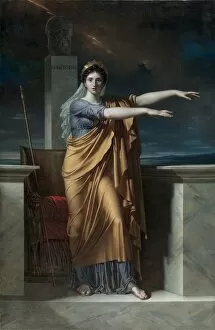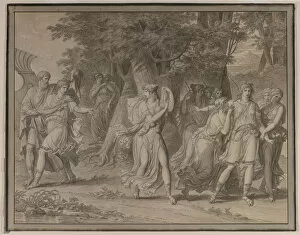Charles Meynier Collection
Charles Meynier, a French artist born in 1768, was known for his exquisite paintings that depicted various mythological and historical figures
All Professionally Made to Order for Quick Shipping
Charles Meynier, a French artist born in 1768, was known for his exquisite paintings that depicted various mythological and historical figures. In one of his notable works titled "Apollo, God of Light, Eloquence, Poetry and the Fine Arts with Urania, Muse of Astronomy" created in 1798, Meynier beautifully captures the essence of Apollo as the bringer of light and inspiration to artists. The painting showcases Urania, the muse of astronomy standing beside him. Another masterpiece by Meynier is "The Muse Erato Writing Verses Inspired by Love, " painted around 1797. This enchanting piece portrays Erato herself engrossed in writing verses inspired by love. It exemplifies Meynier's ability to capture not only the physical beauty but also the emotional depth within his subjects. In "Telemachus Urged by Mentor Leaving the Island of Calypso" from 1800, Meynier depicts Telemachus being guided away from temptation by Mentor. The painting symbolizes courage and wisdom prevailing over allurements. Meynier's portrayal of Clio in "Clio, Muse of History" (1800) showcases her importance as a guardian and chronicler of history. With meticulous attention to detail and vibrant colors, this artwork reflects both Meynier's technical skill and his appreciation for historical significance. Polyhymnia appears twice in Charles Meynier's works; first alongside Erato and Apollo representing eloquence and lyrical poetry respectively; secondly alone as "Polyhymnia Muse Eloquence. " Both pieces highlight Polyhymnia's role as a muse inspiring artistic expression through words. In another creation called "Calliope Muse Epic Poetry" from 1798, we witness Calliope personifying epic poetry itself. Through this painting filled with grandeur and intensity reminiscent of ancient epics themselves, Meynier pays homage to this timeless literary genre.

















